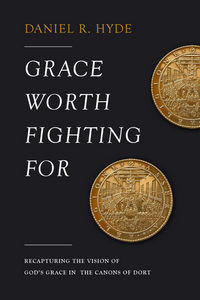 |
Grace Worth Fighting For: Recapturing the Vision of God’s Grace in the Canons of DortPaperback, 378 pg. Read: September 1-29, 2019 |

We need the canons in our fight to preserve and propagate a pristine doctrine of God’s grace in the salvation of sinners like you and me. Here we are plunged to the depths of depravity then raised to behold the eternal love of God. Here we are taken to the cross where we bow before the satisfaction made for us but then arise because it is so sufficient that we must promiscuously publish its news to all tribes, in every nation, on every continent. Here we experience the uncontrollable power of the Holy Spirit (John 3) efficaciously applying the infinite merit of the Son of God to the hearts of sinners like us. Here we feel the pain and struggle that comes with being Christian, loved by the Father but struggling to love, buried with Christ but constantly digging up our sins, filled with the Holy Spirit but being led astray by our own passions. Yet God the triune God is powerful to preserve us in his loving arms and to bring us to the Celestial City.
He goes on from this point for five more paragraphs but to have included it all would’ve been overkill (and possibly copyright infringement), but it’s hard to imagine a more inspiring rally-cry to a book about a 400-year-old document.
It’s always with the books that I take the most notes on that I have the hardest time writing about—I just have too much to sift through to come up with a post. That’s definitely the case here. It’s taken me about a month to come up with a post I can live with (although I’ll probably be mentally re-writing it until February).
In this 400th anniversary of the Synod of Dort which produced the subject of this book, the Canons of Dort, I’ve read three books about the Canons. I apparently saved the best for last (although I started strong, too). This combines the best parts of the other two and builds on them. We get the depth and pastoral insight of Godfrey and the approach of deYoung.
After a great chapter giving the historical background and explaining why the Canons were needed—then and now (see above)—Hyde gives a commentary on each Head of Doctrine, both the positive position and the rejection of errors (the rejections are pretty short, Hyde focuses on what is affirmed).
I don’t have the time to write, and you likely don’t have time to read, a good overview of the book as a whole, so I’m going to use Chapter 7, which covers the Fifth Head of Doctrine “The Perseverance of the Saint.” Sixty-three pages on fifteen paragraphs might seem like overkill, but it almost feels like it’s not (I don’t mean to suggest that Hyde skimped on anything, but you can’t help but feel there’s more to say about all of this). The details will vary, but this’ll give you a taste.
He starts off explaining the Remonstrant position, aka the stuff the Canons are responding to, acknowledging that parts of their position are correct, before highlighting the major problems and then showing how large segments of contemporary Evangelicalism agree with the Remonstrants. Following this Hyde looks at the development of this doctrine throughout Church History, focusing on the contributions of Augustine and Aquinas. Then he summarized the Reformed position. With the context established, Hyde goes through—paragraph by paragraph—the text of the Canons, explaining Scriptural references, focusing on and teasing out particular phrases. He not only explains the position but shows how it’s relevant to the reader’s life and interacts with contemporary critics. A particular strength of this chapter was Hyde’s focus on the Trinitarian nature of God’s preserving His people and tying that to the assurance of faith.
This is an intimidating looking book—over 400 pages if you include the appendices and bibliography—and there’s something daunting about that cover. But no one should be intimidated by it. It’s not a breezy read by any means—but it’s warm, pastoral and approachable. Anyone over 13 should have no problem with it. Sure, some of the topics will leave some scratching their heads and pondering for a while, but that’s because these are weighty, thought-provoking topics, not because of Hyde’s text.
There’s so much more that I want to say, but I’m going to call it quits here. I may have read a better theological book this year, but I can’t think of it off the top of my head. This is simply excellent—rich theology, rich application, solid history, smartly writing, occasionally stirring. I can’t recommend it highly enough.

![]()



Read Irresponsibly, but please Comment Responsibly